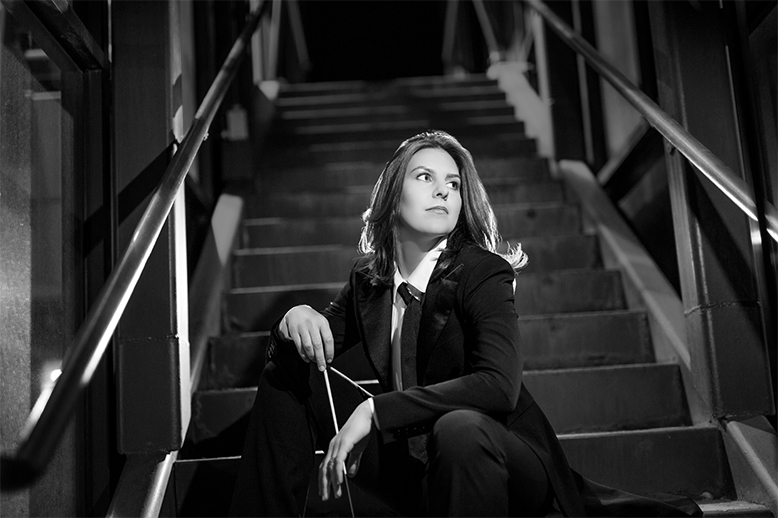
Chicago Opera Theater Music Director Lidiya Yankovskaya is one of America’s few women conductors and a force for change
Originally published in the Fall 2020 issue of CFA magazine. By Andrew Thurston. Photo by Karen Almond
If you watch any US orchestra, particularly one with a multimillion-dollar budget, you’re almost guaranteed to see a white man standing on the conductor’s podium. Most estimates put the share of women conductors in America at or below 10 percent—and that’s only if you include those holding the baton for community groups, youth orchestras, and summer festivals.
At Chicago Opera Theater, Lidiya Yankovskaya (CFA’10) is among the few to crack an especially thick glass ceiling. She’s one of only a handful of women conducting at a leading US orchestra—and one of just two at a major opera company.
“There’s a larger percentage of women who are studying conducting at universities, conducting with smaller organizations, or doing really fantastic work out there,” says Yankovskaya, who sets the tempo and cues in the musicians as Chicago Opera Theater’s Orli & Bill Staley Music Director. “Not enough of them have gotten opportunities to move to the next level and work with larger-budget institutions. But I think it’s changing and will probably continue to change.”
In part, that change is a result of Yankovskaya’s efforts. She chooses work that lifts young composers and helps mentor women looking to follow in her path.
“Her presence behind the podium is breaking down barriers that have long existed for women in the industry,” says Ishan Johnson, associate director of development at Chicago Opera Theater. A voice performance major at CFA, Johnson (CFA’06) has known Yankovskaya since 2008, when the two worked on an Opera Boston performance of Dmitri Shostakovich’s The Nose. “There is a lack of minority and women leadership in opera administration, and Lidiya seeks to change that.”

As music director of the Chicago Opera Theater, Lidiya Yankovskaya (CFA’10) makes it a point to choose work that lifts young composers and helps mentor women looking to follow in her path. Photo by Kate Lemmon
A Nontraditional Trajectory
Born in perestroika-era St. Petersburg, Yankovskaya spent her early childhood in a crumbling Soviet Union, then in a Russia struggling to find its identity. As the country staggered through coups and constitutional crises, waves of Jewish families left, including Yankovskaya’s. In 1995, they fled their home in Russia and became refugees.
“I remember passing by a major square in the middle of the city where fascists would fly large swastika flags and hand out pamphlets that said ‘Kill all the Jews’ on them,” she told Newsweek in 2016. “Russia, in general, at the time was in economic and political turmoil, so there was a lot of hardship overall. When that happens, people tend to blame any larger minorities that exist.”
Many Russian Jews emigrated to Israel, but the Yankovskayas came to upstate New York. Despite the upheaval for young Lidiya—just nine when her family moved across the world—there remained one constant: music.
As a child, Yankovskaya studied piano and voice, adding violin when she moved to the United States. Music was more than a hobby. “It was always something I lived for and that was a top priority for me. I even remember as a kid saying I’d rather just stay home and practice than go do the social thing.”
During high school and college—she studied music and philosophy at Vassar College—Yankovskaya kept practicing and playing, but wasn’t sure what a life in music would look like.
“You see these traditional musical trajectories of where your career would be,” she says. “For me, it seemed that solo piano would be the thing I would have to do, and I did not want to sit alone in a practice room for that many hours and be traveling alone. That just wasn’t right for me.”
Her undergraduate experience included conducting—and she’d even had a few turns with the baton as a teenager. But it was “not something I realized you could make a career out of,” says Yankovskaya.
At CFA, her thinking began to change. For two years, Yankovskaya studied musicology, music theory, and conducting techniques, learning the technical skills necessary to hold an orchestra together. She also began to work as a conductor, standing out front for Opera Boston, Boston Opera Collaborative, and Lowell House Opera. After graduation, she was appointed artistic director and conductor for the Juventas New Music Ensemble, a group dedicated to performing the work of young, contemporary composers, and later added the Commonwealth Lyric Theater to her résumé. Soon, she was being hailed as a rising star.
“If there were a futures market for classical music, the touts would be pushing Lidiya Yankovskaya,” wrote Keith Powers for WBUR in March 2017. “She’s busy. She’s busy because she’s good.”
Three months after that glowing review, Yankovskaya was named music director at Chicago Opera Theater.
“She is as skilled with operas of the past as she is with works of living composers,” said the president of Chicago Opera Theater’s board of directors, Susan J. Irion, of the appointment. “Lidiya is sure to be a charismatic ambassador of opera in today’s world.”
ABOUT CFA MAGAZINE
CFA is a publication for alumni and friends of the Boston University College of Fine Arts. We welcome your feedback on the magazine, this website, or anything else related to CFA. Send us your comments at cfaalum@bu.edu. Find current and past issues at bu.edu/cfa-magazine.